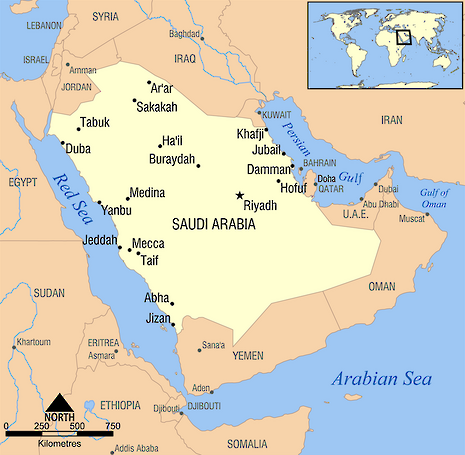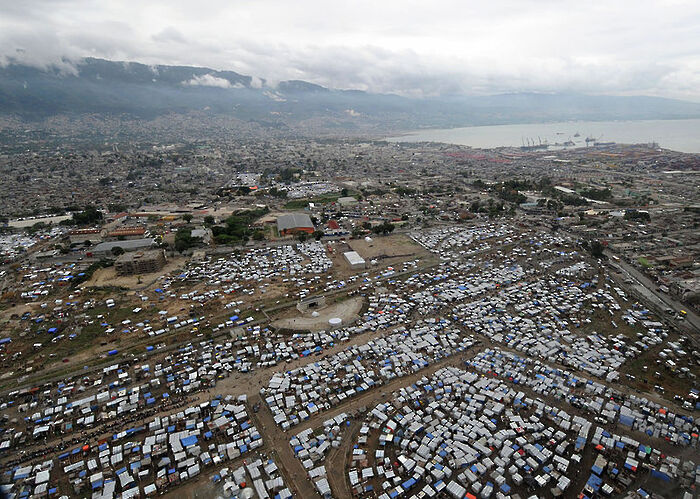Saudi Arabia is a phantom power
Naman Habtom-Desta argues that Saudi Arabia’s recent policies are suicidal – and disaster could have international effects

For decades, the desert kingdom of Saudi Arabia was a triple threat of oil wealth, politico-religious influence, and Western support. Now, the once mighty Gulf hegemon is in the midst of its inevitable decline, threatening Middle Eastern stability as it attempts to keep its head above water.
“Saudi Arabia has the potential to unleash another wave of mass migration”
In its quest to reassert its regional dominance, Saudi Arabia has not only demonstrated its latent weaknesses but also contributed to its self-inflicted downfall. At the heart of its problems lies one nation: Iran. The Islamic Republic doesn’t pose an existential threat to Saudi Arabia but is perceived as a geopolitical threat in what is viewed as a zero-sum game.
Foolishly, the Saudis are engaging the Iranians in various proxy conflicts. The most egregious is its bombardment of Yemen. Besides the humanitarian catastrophe, which includes 20 million Yemenis facing possible starvation, the conflict has exposed Saudi Arabia for what it really is: a paper tiger.
Saudi Arabia's inability to decisively defeat the Iranian-backed Houthi rebels in the poorest Arab country, despite its immense wealth, confirms the limits of material superiority. An unwillingness to deploy ground troops has financially and militarily bogged down the Kingdom in what is, at best for them, a quagmire. Now, the Saudis are left with a dilemma, forced to choose whether to disengage, and confirm to the world its diminished stature, or to dig in in an increasingly unwinnable war.
If the Saudis cannot beat the poorest Arabs, how do they fare against the wealthiest? The severing of diplomatic and economic ties with the small State of Qatar is not simply a dispute between neighbours but a regional crisis, with the Saudis dragging in Egypt, the United Arab Emirates, and Bahrain. What began as an attempt to neuter a non-subordinate state is now a total fiasco. The reestablishment of diplomatic relations between Iran and Qatar, the continued presence of Turkish troops on Qatari soil, and the rejection of a Saudi ultimatum, all illustrate that merely calling their bluff is sufficient to resist subservience.
Similarly, the recent developments in Lebanon – with the Lebanese prime minister (a Saudi national, incidentally) seemingly coerced into resigning his post while in Saudi Arabia, resulting in massive popular and political backlash – prove that while the Saudis may succeed in their tactical goals, they are strategically impotent.
Continually diminished soft power capabilities only leaves more confrontational routes for Saudi Arabia to pursue, routes that it cannot sustain on its own. With oil prices contributing to a mounting national debt, the increasingly growing Saudi military budget, which includes a single arms purchase larger than the annual Russian defence expenditure, will collapse if there is not any life support offered to a nation that continually botches each attempt to widen its reach. More worrying is that its current conduct lacks a grand vision and appears to be improvised.
By arresting powerful princes such as the billionaire Al-Waleed bin Talal, Saudi Arabia loses its biggest asset: its claim to stability. While much of the Arab world succumbed to the Arab Spring, Saudi Arabia escaped unscathed. Now, the internal machinations of the royal family will result in heightened paranoia, with Crown Prince Muhammad bin Salman, who may very well not succeed to the throne due to complicated laws of succession, currently balancing a power struggle both abroad and at home simultaneously with ambiguous results at best.
What does it all mean for us in the West? To those of us in Europe, an increasingly aggressive and militarily unsuccessful Saudi Arabia has the potential to unleash another wave of mass migration. The collapse of Lebanon, itself a host to 1.5 million refugees, could spark another civil war with possible Israeli intervention. The collapse of Iran, with a population three times larger and a landmass four times larger than Iraq, means warfare engulfing everywhere from the Afghan highlands to the Eastern Mediterranean, encompassing a total population of 179 million. Saudi reticence to aid in the aftermath of its reckless interventions means we are left to pick up the mess.
Additionally, if we choose to stand by the Saudis, we risk increased confrontation with Russia, an increasingly victorious combatant in Syria where Saudi-backed Islamist proxies are rapidly losing ground to Assad’s forces. Yet, European policies towards Iran puts us at odds with American enablement of Saudi anti-Iranian conduct, embodied by the US withdrawal from the Iranian nuclear deal. Will Europe hold its own or be dragged by Saudi policymakers? Only time will tell but, either way, it shan’t be good news.
Alas, the region and, by extension, the world, is held hostage as the uncertainties of decline, and the resistance to it, build up. Allowing women to drive and marginal economic reform may slow down, but not reverse, the trajectory that the country is currently on
 Comment / Plastic pubs: the problem with Cambridge alehouses 5 January 2026
Comment / Plastic pubs: the problem with Cambridge alehouses 5 January 2026 News / Cambridge academics stand out in King’s 2026 Honours List2 January 2026
News / Cambridge academics stand out in King’s 2026 Honours List2 January 2026 News / Cambridge businesses concerned infrastructure delays will hurt growth5 January 2026
News / Cambridge businesses concerned infrastructure delays will hurt growth5 January 2026 News / AstraZeneca sues for £32 million over faulty construction at Cambridge Campus31 December 2025
News / AstraZeneca sues for £32 million over faulty construction at Cambridge Campus31 December 2025 Interviews / You don’t need to peak at Cambridge, says Robin Harding31 December 2025
Interviews / You don’t need to peak at Cambridge, says Robin Harding31 December 2025










